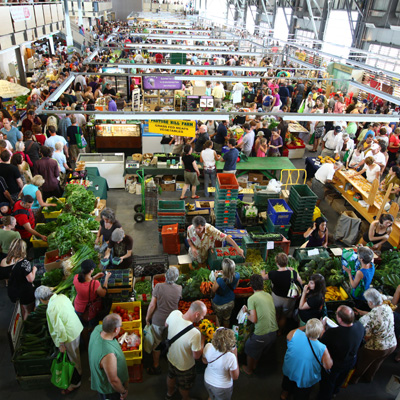 |
| A Saturday morning at the Seaport Farmers' Market. (Bruce Bottomley Photo) |
For many Haligonians, Saturday morning means only one thing—Farmers' Market time! Up until this summer, that meant a trip down to the Alexander Keith’s Brewery on Lower Water Street. However, there’s a new rival market in town, and the question to shoppers has become: go old, go new, or double dip?
The Halifax Seaport Farmers' Market (also open Saturday mornings, 7 a.m. to 1 p.m., though it's working towards being open multiple days a week) is housed in a brand new, shiny, eco-friendly building down at Pier 20. The new market’s grand opening in August attracted huge crowds, and the steady stream of customers hasn’t let up yet!
In fact I was so overwhelmed by the shopper gridlock at my first visit that I vowed to get out of bed much earlier the following Saturday. I did notice slightly more breathing room when I made it there before 9 a.m., but there were still plenty of others trying to beat the rush. As Dal student shopper Amanda Johnson, a third-year Political Science and History major, says: “Keep your elbows up!”
The new market’s wide open, industrial space is quite the contrast to the original brewery market’s cluttered yet charming array of mixed levels and cramped corridors. I asked Dal student Lexi Iulianella, third-year International Development and Sociology, for her first impressions of the new Seaport Market. “It’s nice how it’s so open and lofty,” she comments. Having been a loyal customer at the old location, she feels nostalgic for the brewery building’s historic character, but understands the benefits of the new Seaport Market’s spacious structure. “This one is more functional,” she decides, “because it allows a lot more vendors to become involved.”
Her shopping buddy Megan Tremblay, a third-year year International Development student, agrees the new market is a positive thing, saying, “It’s just a reality that things will expand, I’m just happy it’s not a new Walmart.”
Rhian Williams, third-year International Development and Spanish student, who sometimes busked at the brewery market last year, points out a drawback she’s noticed about the new Seaport building. “It doesn’t have the little nooks and quiet spaces where performers can set up and people can actually stop and listen,” she notes. I definitely saw fewer musicians busking then I was used to seeing at the old market, so Ms. Williams is probably not alone in feeling that the new space is not performer-friendly. Food should obviously be the focus, but live tunes sure add to the atmosphere!
Okay, for those of you thinking that the only thing Saturday morning means to you is sleeping off Friday night’s crazy... studying, I think it’s time to address why the market is worth the sacrifice of precious slumber time.
For students on a budget, it is good to know that many items, especially produce, are available at a lower cost than at the neighbourhood grocery chain. Because of the direct sale between farmer and consumer, transportation costs and superstore mark-ups are eliminated. For those looking for convenient pre-made foods, there are stands offering things like sushi, baked goods, kettle corn, and soups, made locally with fresh, all-natural ingredients (and NOT packed with sodium and preservatives).
Like many market devotees, Lexi and Megan frequent the market not only to pick up affordable local and organic foods, but also to enjoy the unique ambience of this bustling community gathering spot. “I like to buy breakfast here,” says Lexi, “I look forward to it.”
After spotting Dal’s College of Sustainability Director, Professor Steven Mannell, at the new Seaport location, I asked him to weigh in on how students can benefit from shopping at the market. “Students get a greater sense of the community of farmers and eaters,” he says, “and a chance to pay real attention to what they eat and how their food interacts with climate, culture, and people.”
Prof. Mannell follows his own teaching, buying about 80 per cent of his food at the market year round. “I shop at the market in order to get fresher food, with better taste and texture, and to support our local community,” he explains.
I asked Prof. Mannell how he likes the new location, and whether he will still shop at the brewery market -- now known as the Historic Farmer’s Market. So far he has kept up shopping at both but says, “Adding more time to visit two markets will be tough to do on a regular basis.”
On the bright side, the fact that there is enough demand to support two farmers markets in Halifax is a good sign that the local food movement is really gaining momentum. A little healthy competition never hurt anyone, right? I suggest checking out both and deciding which one YOU prefer. If it’s too hard to choose, you can always do double-duty!
Ellen Denny is a third-year Dal student taking a BA combined honours in music and theatre.
